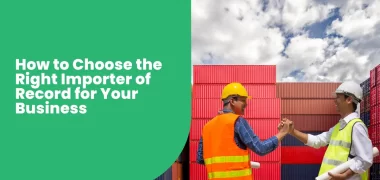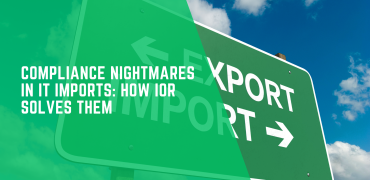In today’s globalized economy, expanding your business across borders has become more accessible and necessary for growth. However, navigating the complexities of international trade can be daunting. One critical element in this process is selecting the right Importer of Record (IOR). The IOR plays a vital role in ensuring your goods comply with all import regulations and reach their destination smoothly. This blog post will guide you through the key factors to consider when choosing the right Importer of Record for your business.
1. Understanding the Role of an Importer of Record
An Importer of Record (IOR) is an entity responsible for ensuring that imported goods comply with local laws and regulations. The IOR handles all the necessary documentation, payment of duties, taxes, and fees, and ensures the goods meet the required standards and regulations of the destination country. The IOR’s responsibilities include:
- Preparing and filing import documentation
- Paying import duties and taxes
- Ensuring compliance with all local regulations
- Handling inspections and audits
- Maintaining records for regulatory purposes
The IOR can be a third-party logistics provider, a customs broker, or a specialized IOR service provider. Choosing the right IOR is crucial for the smooth functioning of your international trade operations.
2. Importance of Choosing the Right IOR
Choosing the right IOR is essential for several reasons:
- Regulatory Compliance: Ensuring that your goods comply with the import regulations of the destination country is critical. Non-compliance can result in fines, delays, and even confiscation of goods.
- Risk Management: An experienced IOR can help mitigate risks associated with international trade, such as incorrect documentation, delayed shipments, and unexpected costs.
- Operational Efficiency: A reliable IOR can streamline your import processes, reducing delays and improving overall efficiency.
- Cost Savings: By handling duties, taxes, and compliance effectively, a good IOR can help you avoid unnecessary expenses and optimize your import costs.
3. Key Considerations When Selecting an IOR
Expertise and Experience
When choosing an IOR, it’s important to assess their expertise and experience in your industry and the specific countries you are importing into. Look for an IOR with a proven track record in handling similar products and navigating the regulatory landscape of your target markets.
Regulatory Compliance
Ensure that the IOR is well-versed in the import regulations of the countries you are targeting. They should have a deep understanding of customs procedures, documentation requirements, and compliance standards. An IOR with strong regulatory knowledge can help you avoid compliance issues and ensure smooth customs clearance.
Reputation and Reliability
The reputation and reliability of an IOR are critical factors to consider. Look for an IOR with positive reviews, testimonials, and a solid reputation in the industry. Reliability is key to ensuring that your goods are handled efficiently and reach their destination without unnecessary delays.
Geographic Coverage
Consider the geographic coverage of the IOR. If you are importing into multiple countries, it’s beneficial to work with an IOR that has a global presence and can manage imports across different regions. This ensures consistency and simplifies your import processes.
Technology and Infrastructure
Evaluate the technology and infrastructure that the IOR has in place. Modern technology can streamline import processes, improve tracking and visibility, and enhance communication. An IOR with robust IT systems and infrastructure can provide better service and support.
Cost and Value
While cost is an important factor, it should not be the only consideration. Assess the value that the IOR brings to your business. Consider the quality of service, expertise, and potential cost savings from efficient handling of imports. A slightly higher cost may be justified if the IOR provides exceptional value and minimizes risks.
Customer Support
Strong customer support is essential for addressing any issues or concerns that may arise during the import process. Choose an IOR that offers excellent customer support, with responsive communication channels and a dedicated support team.
4. Questions to Ask Potential IOR Partners
To ensure you choose the right IOR for your business, ask the following questions:
- What experience do you have in handling imports for my industry?
- Can you provide references from other clients in my sector?
- How do you stay updated on changes in import regulations and compliance requirements?
- What geographic regions do you cover, and do you have local expertise in those areas?
- What technology and systems do you use to manage import processes?
- How do you handle customs inspections and audits?
- What is your fee structure, and what services are included?
- How do you ensure the security and confidentiality of my import data?
- What level of customer support do you offer, and how can I contact you in case of an issue?
- Can you provide a detailed case study or example of how you successfully managed a complex import scenario?
5. Common Mistakes to Avoid
When choosing an IOR, avoid these common mistakes:
- Focusing Solely on Cost: Choosing the cheapest option can lead to poor service and increased risks. Focus on value and quality instead.
- Ignoring Reputation: Failing to check the IOR’s reputation can result in working with an unreliable partner. Always research and seek references.
- Overlooking Regulatory Expertise: Not ensuring that the IOR has sufficient regulatory knowledge can lead to compliance issues and delays.
- Neglecting Customer Support: Poor customer support can cause significant disruptions. Ensure the IOR provides robust support services.
- Not Considering Geographic Coverage: If you import into multiple countries, choose an IOR with the necessary global reach to manage all your imports effectively.
6. Conclusion
Choosing the right Importer of Record is crucial for the success of your international trade operations. An experienced and reliable IOR can ensure regulatory compliance, mitigate risks, and streamline your import processes. By considering factors such as expertise, regulatory compliance, reputation, geographic coverage, technology, cost, and customer support, you can select the best IOR partner for your business.
Take the time to thoroughly evaluate potential IOR partners, ask the right questions, and avoid common mistakes. Doing so will help you build a strong foundation for your international trade operations, ensuring smooth and efficient imports that support your business growth.




